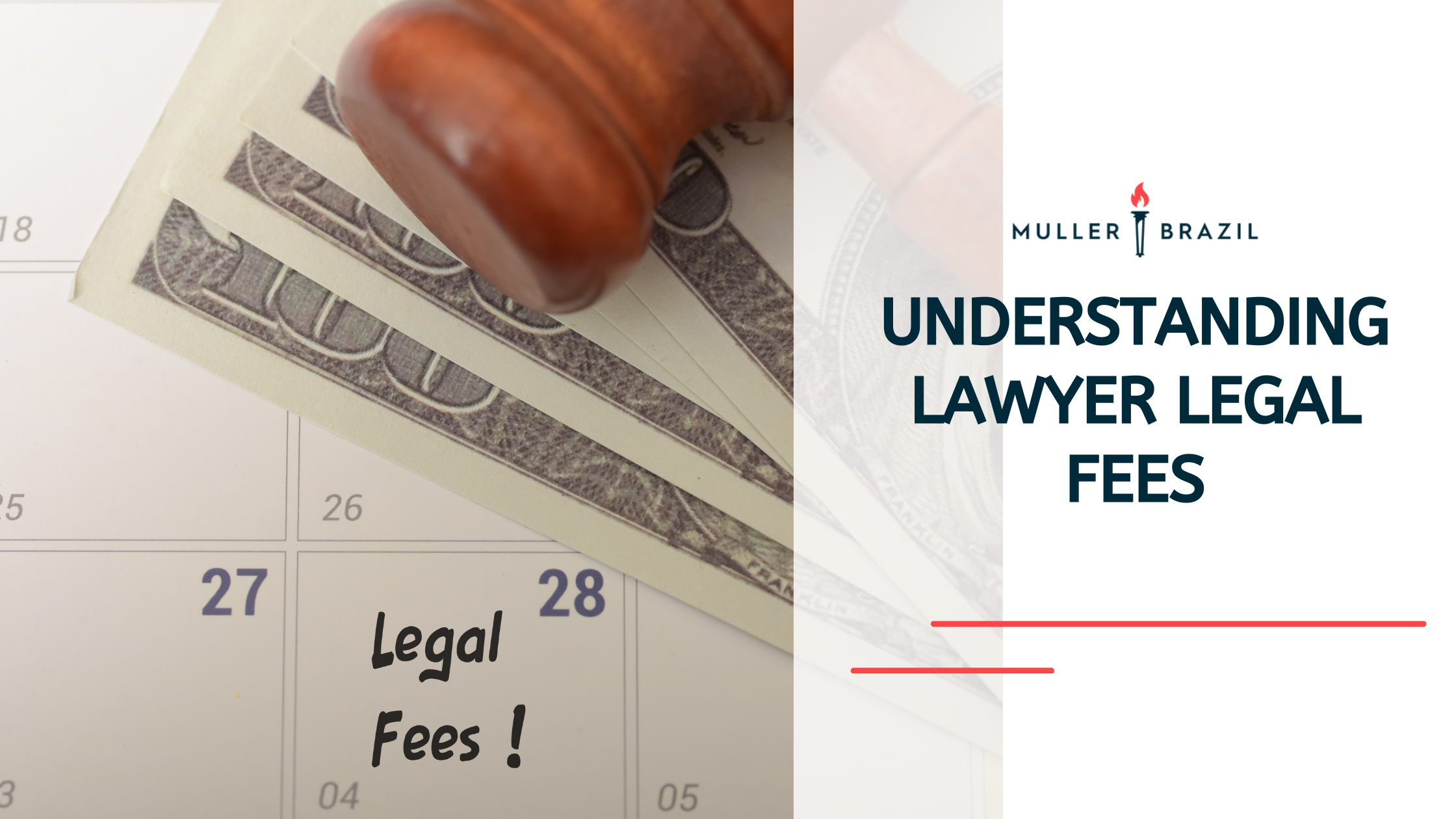Hiring a lawyer is an important step in protecting your rights and working through the legal system, but understanding legal fees can feel daunting at first. Legal fees refer to the costs associated with obtaining legal services from an attorney or law firm. These fees can vary significantly depending on several factors, including the type of case, the lawyer’s experience, and the location.
At Muller Brazil, we operate exclusively on a contingency fee basis, meaning our clients face no upfront costs and only pay when we successfully resolve your case. This approach guarantees that financial constraints never stand in your way of securing high-quality legal representation. By aligning our success with yours, we eliminate any financial risk while giving you confidence in our commitment to achieving the best possible outcome for your case.
Knowing how lawyer fees work can help clients make informed decisions about hiring legal representation. Whether you're pursuing a personal injury claim, resolving a family law matter, or defending yourself in a criminal case, understanding the financial commitment involved is necessary.
Reasons to understand legal fees include:
- Budgeting for legal expenses: Awareness of potential costs, such as filing fees and other expenses, helps clients plan their finances accordingly.
- Avoiding surprises: Clear communication about fees, including hourly rates, retainer fees, or contingency fee arrangements, reduces the likelihood of unexpected bills.
- Evaluating fee structures: Clients can better assess whether a flat fee, hourly fee, or contingent fee model suits their legal needs.
Here we will provide an overview of common fee arrangements, including hourly rates, contingency fees, and retainer fees. We’ll also discuss factors that affect attorney fees, managing additional costs like court costs and travel expenses, and tips for reducing legal expenses. By the end, you’ll feel more prepared to evaluate written fee agreements and confidently hire legal services that fit your budget and needs.
Types of Fee Arrangements
Understanding the different types of fee arrangements lawyers use can help clients choose the best option for their legal needs. Fee structures vary based on the type of case, the lawyer’s experience, and the services required. Below are the most common fee arrangements used in legal services:
Hourly Fees
- Lawyers charge a set hourly rate for time spent working on a case.
- Hourly rates often depend on the lawyer’s experience, the case’s complexity, and the local market.
- This structure is common in family law and criminal cases where ongoing legal representation is required.
While Muller Brazil operates on a contingency fee basis, understanding hourly fee structures in personal injury law can provide context:
- Hourly Rates: Personal injury attorneys may charge between $200 and $500 per hour, depending on experience and case complexity.
- Case Example: A complex personal injury case requiring 50 hours of work could result in legal fees ranging from $10,000 to $25,000.
Retainer Fees
- A retainer fee is an upfront payment made to secure a lawyer’s services.
- It is often used as a deposit, with funds deducted as the lawyer works on the case.
- Retainer fees provide stability for clients who need continuous legal representation.
In personal injury cases, retainer fees are less common due to the prevalence of contingency arrangements.
- Retainer Amounts: When applicable, retainers might range from $5,000 to $15,000, depending on the anticipated complexity and duration of the case.
- Case Example: Securing representation for a medical malpractice claim might require a $10,000 retainer, with additional costs billed hourly.
Contingency Fee Arrangements
- In a contingency fee model, the lawyer only gets paid if the case wins.
- Payment is based on a percentage of the final settlement or court award.
- This structure is common in personal injury cases and reduces financial risk for clients.
- Muller Brazil operates on a contingency fee basis, guaranteeing clients can pursue legal action without upfront payments.
- Contingency fees often range from 25% to 40% of the settlement or court award
Flat Fees or Fixed Fees
- A flat fee involves a set payment for specific legal services, such as drafting contracts or wills.
- This option works well for predictable tasks with clear timeframes and costs.
Additional Costs and Expenses
- Beyond standard fees, clients should ask about court costs, filing fees, expert witness charges, and travel expenses.
- Many lawyers outline these costs in a written fee agreement to avoid misunderstandings.
- Court Filing Fees: Typically range from $200 to $500, varying by jurisdiction.
- Expert Witness Fees: Experts may charge $300 to $500 per hour, with total costs depending on case requirements.
- Medical Record Retrieval: Obtaining records can cost between $50 and $200.
- Deposition Costs: Transcription services may charge $5 to $10 per page, leading to total costs of $500 to $1,000 for lengthy depositions.
Get Help Today
Factors Affecting Lawyer Legal Fees
Several factors influence the cost of hiring a lawyer. Understanding these variables can help clients anticipate expenses and choose the right legal services for their needs.
Field of Law
- Legal fees vary depending on the type of case.
- Personal injury cases often operate on a contingency fee basis, while family law or criminal cases may involve hourly fees or retainer fees.
- Areas like intellectual property or corporate law may command higher attorney fees due to specialized knowledge.
Local Market Rates
- Lawyers in urban areas often charge higher hourly rates than those in rural regions, reflecting differences in cost of living and demand.
- State-specific averages also vary, with cities like New York and Los Angeles having higher costs compared to smaller towns.
Lawyer’s Experience and Expertise
- A lawyer’s experience can impact the fees charged. Attorneys with a proven track record in specific fields may command higher rates.
- Clients often pay more for lawyers with specialized knowledge or a history of winning cases.
Case Complexity
- The more complex the case, the higher the potential costs. Cases requiring extensive research, expert witnesses, or depositions may lead to additional expenses.
- Cases with multiple parties, such as class-action lawsuits, may involve different fee structures to accommodate added workload.
Payment Structure
The fee arrangement also affects the total cost.
- Contingency fees reduce upfront expenses but involve a percentage of the award if the case wins.
- Flat fees provide predictable costs but may not cover additional court costs or travel expenses.
- Hourly fees depend on time spent and may fluctuate based on case developments.
Average Lawyer Costs by Location
The cost of hiring a lawyer often depends on location, with significant differences between urban and rural areas. Lawyers practicing in cities typically charge higher hourly rates due to higher operating expenses and greater demand for legal services.
For example, attorneys in New York City or Los Angeles may charge $400 or more per hour, while those in smaller towns or rural areas might offer rates closer to $150 per hour. This pricing gap reflects not only the cost of living but also the concentration of specialized legal representation in major metropolitan areas.
State-specific averages also play a role in determining attorney fees. States like California, Massachusetts, and New York tend to have higher costs due to increased demand and higher living expenses. On the other hand, states such as Texas and Florida often have lower fees charged, making legal assistance more affordable in certain regions. However, even within states, costs can vary widely based on local markets and case complexity.
In addition to standard lawyer fees, clients should prepare for additional costs such as filing fees, court costs, and travel expenses. Some cases, particularly those involving expert witnesses or complex litigation, may require extra payments that are not included in the initial fee agreement. Many lawyers provide a written fee agreement outlining these expenses upfront, helping clients understand their financial obligations and avoid unexpected bills.
The type of legal case often impacts pricing. Personal injury cases typically follow a contingency fee model, meaning clients only pay if their case wins. While family law and criminal cases may involve flat fees or hourly rates, depending on the scope of work. These variations highlight the importance of discussing fee structures in advance to make sure that the arrangement fits your legal needs and budget.
Contact Us Now
Understanding Your Fee Agreement
A fee agreement is a written contract between a lawyer and client that explains how the lawyer will be paid for their legal services. This document serves as a roadmap, outlining important details about costs, billing practices, and additional expenses. Reviewing your fee agreement carefully can prevent misunderstandings and give you confidence in the process.
Components of a Fee Agreement
- Scope of Work: The agreement should clearly define the legal services the lawyer will provide. This includes whether the representation is limited to certain tasks or covers the entire case.
- Payment Terms: It specifies how and when payments are due, whether through hourly rates, flat fees, or a contingency fee structure. For contingency fees, it should explain the percentage the lawyer will take if the case wins.
- Additional Costs: The contract should detail court costs, filing fees, travel expenses, and expert witness charges. Understanding these other expenses upfront helps clients avoid surprises.
- Refunds or Withdrawals: Some agreements include terms for refunds if services end early or if the client decides to change lawyers.
Why a Clear Fee Agreement Matters
Having a written fee agreement is important for protecting both the client and the lawyer. It reduces the risk of disputes, ensures transparency, and outlines the client’s financial responsibilities. For contingency fee cases, such as personal injury, the agreement clarifies that the client pays only if the case wins.
Questions to Ask Before Signing
- Does the fee agreement explain the percentage the lawyer will take in a contingency fee case?
- Are additional costs like filing fees or court costs included?
- What happens if the case requires expert witnesses or travel expenses?
- Is there flexibility if other expenses arise?
Before signing, take time to review the agreement, ask questions, and clarify any unclear terms. A transparent fee agreement helps build trust and confirms both parties are on the same page about fees charged and expectations.
Final Thoughts on Managing Legal Costs
Understanding legal fees is a necessary step in choosing the right lawyer and planning for the costs of legal representation. Whether your case involves personal injury, family law, or criminal cases, knowing what to expect can help you make informed decisions.
Takeaways:
- Always review the written fee agreement carefully to understand the fee structures, including contingency fees, flat fees, and hourly rates.
- Ask questions about additional costs like filing fees, court costs, and travel expenses to avoid surprises.
- Consider factors like the lawyer’s experience, location, and legal needs when evaluating costs and potential outcomes.
At Muller Brazil, we operate on a contingency fee basis, meaning our clients don’t pay unless we win their case. This approach allows us to provide high-quality legal services without creating a financial burden. Our free consultations make it easy to explore your options and understand how we can help.
Contact Us Today
If you’re ready to discuss your case, reach out to Muller Brazil for a free consultation at 215.885.1655 or info@mullerbrazil.com. We’re here to fight for your best interests and provide the legal representation you deserve.
Meet the Author
Max Muller - Founding Partner
Maximillian J. Muller is a founding member of Muller Brazil and My Vaccine Lawyer. Mr. Muller is an experienced litigator in both Federal and State Courts in the areas of vaccine injury, unsafe drug and medical device injury, personal injury, mass torts, and bad faith. Mr. Muller prides himself on keeping Muller Brazil on the cutting edge of injury litigation and running a client-focused practice.
Learn more about Max Muller ⇒


